AFSC stands for Air
Force Specialty
Code. Like an Army MOS, it signifies an airman's job specialty. Lt. Col
Gerald McManus' specialty code is 52R3: Chaplain. For deployment
purposes,
he is also coded as a C3 which identifies him as a Catholic Chaplain.
He serves as Wing Chaplain at
McGuire Air Force Base, New Jersey, and is presently deployed as Group
Chaplain for the 506th Air Expeditionary Group at Freedom Air Base,
Kirkuk, Iraq.
Q: How did you become
involved in the
chaplaincy?
A: I was ordained as a
priest of the
Archdiocese of Philadelphia 25 years ago. During the first thirteen
years of
my priesthood, I served in three different parish assignments in the
Archidocese. During the last ten of those years, beginning in
1982, I was also
serving as a chaplain in the Air Force Reserve...putting on the uniform
and serving
at nearby Air Bases. In 1992, Cardinal Bevilacqua, former Archbishop of
Philadelphia, gave me permission to enter the active duty Air
Force. Since
then I've been a full-time, active duty Air Force Chaplain.
Q: What do you see as
your
mission in
Iraq?
A: We're here to assist
the
Coalition
Forces in the rebuilding of Iraq, to help build hospitals and schools,
protect them and help them get back on their feet after the last
regime. But I don't
see my role here as political. I am here to support the spiritual
health of our
military members.
Q: What is your role as
a
chaplain?
A: It's a dual role. As
a
Catholic
priest I minister to the Catholic community, which includes Army and
Air Force
members, civilian contractors and third country nationals working in
Iraq, many of
them from India and the Philippines. But for all chaplains, our
ministry
goes beyond denominational lines. The purpose of the chaplaincy is to
provide for free
exercise of religion as guaranteed by the U.S. Constitution. As a
chaplain,
my responsibility is to provide for all Christians, Jews, Buddhists,
Muslims, and other faith groups. It's a rewarding challenge to have
first hand
experience with members of other faith groups and to minister to them.
Q: The military often
advertises for
chaplains in religious publications. Is there a shortage of Catholic
chaplains?
A: Vocations are a critical issue in
our country across the board. The Archdiocese for the Military Services
does not
train or ordain its own priests. It relies on the generosity of
diocesan bishops to
meet the requirements of the military services for priests in uniform.
But the truth
is that every diocese has members serving in the military. The bishops
are
recognizing that fact and allowing their priests to wear the uniform
for a period of
time. That could be on a part-time basis for chaplains in the Guard or
Reserve,
or full-time for the active duty Services. The Military
Archdiocese also supplies
priest chaplains to meet the needs of the Veterans Administration.
Q: If someone is
interested
in the
chaplaincy, what should they do?
A: Talk to your local priest or contact the Archdiocese for the
Military
Services, USA in
Washington D.C. at (202) 269-9100 or through their website at
www.milarch.org.
Note: (For more information on the chaplaincy, contact a minister,
rabbi or other clergy).
© copyright Gord Wilson, 2004.
Left: Airmen install
fiber optic communications cable;
Center: Coalition Forces Flag Plaza, Qatar;
Right: Airmen install a manhole in Kirkuk, Iraq
|
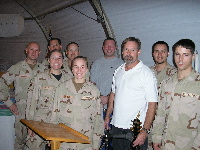
Choir
prepares for Protestant Chapel
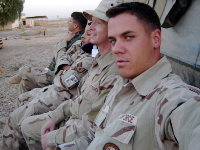
SSgt Kellen Martini and
airmen, Kirkuk, Iraq
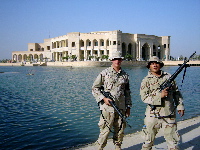
The Water Palace,
Baghdad, one of Sadam Hussein's numerous palaces
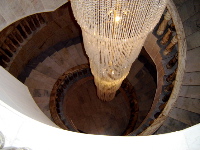
Palace interior view of
the spiral staircase and chandelier

Palace interior courtyard and pool.
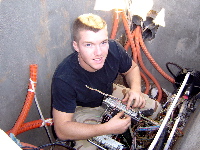
Sra Andy Hoar of the Ohio Air
National Guard

The author in Iraq
(Click on photos for larger pictures).
|